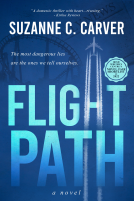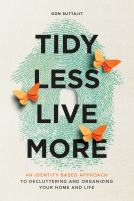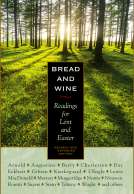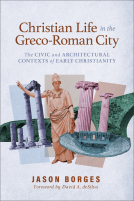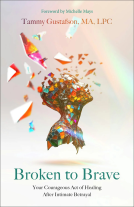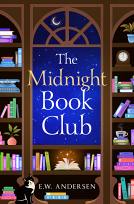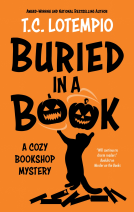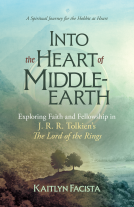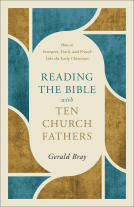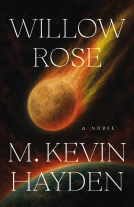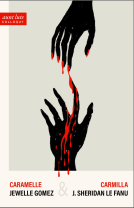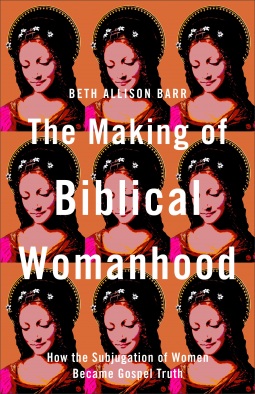
The Making of Biblical Womanhood
How the Subjugation of Women Became Gospel Truth
by Beth Allison Barr
This title was previously available on NetGalley and is now archived.
Send NetGalley books directly to your Kindle or Kindle app
1
To read on a Kindle or Kindle app, please add kindle@netgalley.com as an approved email address to receive files in your Amazon account. Click here for step-by-step instructions.
2
Also find your Kindle email address within your Amazon account, and enter it here.
Pub Date 20 Apr 2021 | Archive Date 6 Jul 2021
Baker Academic & Brazos Press | Brazos Press
Talking about this book? Use #TheMakingofBiblicalWomanhood #NetGalley. More hashtag tips!
Description
It is time for Christian patriarchy to end.
Biblical womanhood--the belief that God designed women to be submissive wives, virtuous mothers, and joyful homemakers--pervades North American Christianity. From choices about careers to roles in local churches to relationship dynamics, this belief shapes the everyday lives of evangelical women.
Yet biblical womanhood isn't biblical, says historian Beth Allison Barr. It arose from a series of clearly definable historical moments. Barr presents historical insights and shares a better way forward for the contemporary church by
● giving context for contemporary teachings about women's roles in the church
● explaining why biblical womanhood is more about human power structures than the message of Christ
● interweaving her story and experiences as a Baptist pastor's wife
● shedding light on the #ChurchToo movement and abuse scandals in Southern Baptist circles and the broader evangelical world
This book moves the conversation about biblical womanhood beyond Greek grammar and into the realm of church history--ancient, medieval, and modern--to show that this belief is not divinely ordained but a product of human civilization that continues to creep into the church.
"A powerful work of skillful research and personal insight."--Publishers Weekly
Christianity Today 2022 Book Award Finalist (History & Biography) ● Foreword INDIES 2021 Finalist for Religion
Advance Praise
“Throughout this book, Barr talks about how her world was transformed. Readers should be ready to have their worlds transformed too. She shakes our shallow historical foundations by revealing how much of so-called ‘biblical’ womanhood reflects the culture rather than Christ. By taking us through her own heartbreaking journey of exclusion from her faith community, she demonstrates the temerity that we need to live the simple, yet disruptive truth that all women and men are created in the image of God. The Making of Biblical Womanhood is about unmaking the harmful patterns of patriarchy in the church, society, and our own hearts.”—Jemar Tisby, CEO of The Witness Inc.; New York Times bestselling author of The Color of Compromise
“This is a book unlike anything I’ve read before. Drawing on her extensive research into the history of Christianity, Barr upends everything you thought you knew about Christianity and gender. This fervent, bold, and sweeping history of Christianity and patriarchy is an absolute game changer. Any future debates will need to reckon with Barr’s contention that the subjugation of women has nothing to do with gospel truth.”—Kristin Kobes Du Mez, professor of history and gender studies, Calvin University; author of Jesus and John Wayne
“The Making of Biblical Womanhood has done in one volume what many other books in recent years have done in part: it demonstrates that so-called biblical womanhood is not actually biblical. Though Barr explores and analyzes church history and theology in this well-researched book, it is no boring academic tome. She weaves together personal narrative to remind readers of the humanity of this issue too. This book has the power to help Christians build a faith where ‘there is neither male nor female,’ to liberate women from patriarchal hierarchies, and to heal the pain inflicted by countless churches. I have waited my entire adult life for a book like this, and I am excited that it has finally arrived.”—Jonathan Merritt, contributing writer for The Atlantic; author of Learning to Speak God from Scratch
“It’s time—no, it’s way past time—that we take a critical look at how complementarians have been leaving women leaders and teachers out of church history books and expose the movement of ‘biblical womanhood’ for what it is. I love how Beth Allison Barr’s expertise in medieval church history contributes to the discussion of women in the church. While I may not align completely with Barr’s argument, I affirm with her the need to acknowledge the different ways women have led in church history and should now. I affirm with her that Christ calls women in his church to teach. And I affirm with her that so-called complementarianism isn’t the only option, or even a good one, for those who uphold the authority of Scripture. Read this book and be challenged and encouraged. I’m glad she wrote it.”—Aimee Byrd, author of Recovering from Biblical Manhood and Womanhood and No Little Women
“The Making of Biblical Womanhood is a journey into the sometimes pained, sometimes joyous heart of Beth Allison Barr’s own story but also into the secret rooms of a conservative Christian doctrine of ‘biblical womanhood’ that is no more biblical than choir robes or three-point sermons, or Christian nationalism. The number of mistaken theological interpretations present in evangelical complementarianism Barr exposes are too many to count. Barr’s careful historical examples drawn especially from medieval history hold together a brilliant, thunderous narrative that untells the complementarian narrative. I could not put this book down.”—Scot McKnight, professor of New Testament, Northern Seminary
“To control the future, you must control the past, George Orwell observed. The church’s failure to understand its own history through the experiences of women cripples our very comprehension of Christianity. The Making of Biblical Womanhood is a profound historical examination of patriarchy’s impact from the perspective of Christian women. Without this book, we cannot fully know ourselves or our faith.”—Mimi Haddad, president, CBE International
“The Making of Biblical Womanhood will send shock waves through conservative evangelical Christianity. Powerful personal testimony, a solid handle on the theology and biblical issues at stake in the debate over the role of women in the church, and a historian’s understanding of how the past can speak to the present inform Barr’s convincing challenge to patriarchy and complementarianism. This book is a game changer.”—John Fea, Distinguished Professor of History, Messiah University
“In this timely, valuable volume—written with pluck and aplomb—historian Beth Allison Barr shows that ‘biblical womanhood’ is more a socio-historical construct than a scriptural prescription. I trust this deeply personal and purposely provocative book will be widely and carefully read, especially by those in patriarchal, Protestant evangelical circles who will be tempted to dismiss it out of hand.”—Todd D. Still, Charles J. and Eleanor McLerran DeLancey Dean, William M. Hinson Professor of Christian Scriptures, Baylor University, Truett Seminary
“The Making of Biblical Womanhood is an exceptionally thoughtful and valuable contribution to debates in contemporary American religion. Beth Allison Barr combines an autobiographical approach to her topic with exemplary textual and historical scholarship, all presented in admirably lucid writing. The resulting book is at once convincing and moving.”—Philip Jenkins, author of Fertility and Faith: The Demographic Revolution and the Transformation of World Religions
“I have never lived in the world of complementarianism, but I have seen its damage up close in many students and their churches. Barr’s searing report of her own journey makes her account of the bankruptcy of complementarian interpretations of the Bible and church history urgent and compelling. To borrow her conclusion: it’s time for this travesty to stop!”—Beverly Roberts Gaventa, Distinguished Professor of New Testament, Baylor University
Available Editions
| EDITION | Other Format |
| ISBN | 9781587434709 |
| PRICE | $19.99 (USD) |
| PAGES | 256 |
Average rating from 48 members
Featured Reviews
 Librarian 248184
Librarian 248184
A must-read for anyone curious about the role of women - and how it has devolved over time- in Christianity.
 Hannah L, Librarian
Hannah L, Librarian
“Evidence shows me how Christian patriarchy was built, stone by stone, throughout the centuries. Evidence shows me how, century after century, arguments for women’s subordination reflect historical circumstances more then the face of God. Evidence shows me that just because complementarianism uses biblical texts doesn’t mean it reflects biblical truth. Evidence shows me the trail of sin and destruction left in the wake of teachings that place women under the power of men. Evidence shows me, throughout history, the women who have always known the truth about patriarchy and who have always believed that Jesus sets women free...isn’t it time for all of us to be free?”
Wow wow wow. I blew through this book in less than 24 hours because I could not stand to put it down. Barr has traced the history of Christianity and made a compelling argument that “biblical womanhood” has little to do with what the Bible says and much to do with what culture says. I had the privilege of reading an advanced, digital copy of this book but I look forward to purchasing a physical copy upon its release.
"Biblical Womanhood" is not, in fact, biblical.
This is the key message that flows throughout Baylor University historian Beth Allison Barr's informative and engaging "The Making of Biblical Womanhood: How the Subjugation of Women Became Gospel Truth," due to be released by Baker Academic & Brazos Press in April 2021.
If you know me, you won't be surprised that I embrace this key message.
It's a key message that acknowledges historical truths, truths of which Barr is well aware, and yet it's also a key message that faces passionate rejection to this day by many within conservative evangelical circles.
The simple truth is that "Biblical Womanhood," or the belief that God designed women to be submissive wives, virtuous mothers, and joyful homemakers, is less about biblical adherence and far more about the ways that human civilization creeps its way into church teachings and church polity and church practice.
To read "The Making of Biblical Womanhood" is to take a journey through not only biblical history, but also Beth Allison Barr's own journey. She weaves together beautifully historical truths and personal testimony, taking us through precise historical moments that perpetuated the continuation of biblical womanhood while also giving us glimpses, at times quite painful ones, of her own journey within evangelical complementarianism and the moments that finally made it all fall apart for her.
I certainly do not understand what it feels like to be a woman in ministry. However, as a person with a disability who has served in ministry I do have some understanding of the societal blinders that cause the gifts of many to be rejected or minimized. Because of a body that seldom acts like I wish it would act, I have a very clear understanding of what it feels like to have my ability questioned.
Over and over and over again.
I suppose I'm glad that, somehow, I grew up differently. It's weird, really. I grew up a Jehovah's Witness, a denomination that certainly did not embrace women in leadership roles. Yet, I also grew up with spina bifida, a disability that caused me to have well over 50 surgeries before I was 18-years-old and to be told repeatedly that I could never survive and never thrive. Quite honestly, I survived because of the skill and the strength and the passion and the tenderness of women. While I certainly had males who treated me, much of my childhood was spent around female nurses and aides who believed in me when no one else did.
I thrived because they refused to allow me not to thrive.
Once I was away from the Jehovah's Witnesses, though I should say kicked out for the first of what would be two experiences with churches telling me to leave, I began to realize there was a different kind of God I'd never experienced. By my early 20's, I joined a small interfaith church led by a former nun who would mentor me and whose church would eventually ordain me.
It was the first of several experiences of women in ministry that made me study and learn and seek to understand. Just this past year, as I entered a hospital for what would be my third amputation, I recall the steady presence of Rev. Anastassia, an incredible minister whose presence stays with me even as she has departed for a pastoral position on the East Coast.
"The Making of Biblical Womanhood" made me shout. It made me ache. Like Barr, I understand what it's like to stay someplace because it's familiar and safe and family and the alternative is scary.
I also understand what it's like to kick myself for doing so.
"The Making of Biblical Womanhood" is extraordinarily researched, yet it's equally as remarkable in its transparency and vulnerability and absolute presence. Barr refuses to hide behind her choices, acknowledging all those little difficult places in her journey that helped her finally reach this point of say "No more."
She shares the journey of her life, her college days and her marital journey including a journey with her husband that is best experienced through her own words but is quite revealing and memorable.
There are very few writers, Kate Bowler perhaps being one of the best, who can so expertly weave together such precise and comprehensive research along with rich, emotionally resonant personal testimony. The beauty and the power of "The Making of Biblical Womanhood" is that it does both in abundance.
"The Making of Biblical Womanhood" goes beyond the exploration of Greek grammar into the realms of ancient, medieval, and modern history to explore the cultural influences that created and continue to foster biblical womanhood. She weaves in stories from her own experiences as a Baptist pastor's wife and, appropriately so, explores the #ChurchToo movement and the abuse controversies that have plagued Southern Baptist circles and the broader evangelical movement.
Beth Allison Barr theologically smashes the patriarchy, yet she does so in a way that is far from malicious and, in fact, is quite loving. She's simultaneously someone you'd love to sit down to have coffee with, yet you're acutely aware she's so intelligent that you'd probably not understand a good majority of what she's saying.
Until it clicks. And it will. It will because even in her writing she works to make things accessible and understandable. You can feel it in her teaching, as well. She knows what she knows, but she truly wants you to understand it. It's really quite extraordinary.
In all likelihood, "The Making of Biblical Womanhood" is my final book in what has been an active year of reading. It is a book I was excited to read and it's a book that not only lived up to my expectations but surpassed them. From beginning to end, I found myself engaged and informed, emotionally involved and even a little entertained. At times, I set the book aside so I could chew on her words for a bit. Likewise, at times I set the book aside so I could look things up and understand even more.
I already embraced women in ministry and leadership prior to reading "The Making of Biblical Womanhood," but Barr helped me develop a stronger academic and theological argument to support my beliefs and to inform others. She also challenged me to become an even better and more outspoken Christian, a Christian who not only believes in ministry and leadership for women and others but someone who actively engages and empowers those with gifts who are often left on the sideline by the Church.
There's so much that I loved about "The Making of Biblical Womanhood" and I look forward to sharing it with my circle and following Barr's teachings and writings for years to come.
Beth Allison Barr’s “The Making of Biblical Womanhood” is an eye-opening piece of literature that reveals the origin of the concept of womanhood. It was not thrust down from the heavenly archives as some might believe. To be exposed to the incredible construction of the concept (very human indeed) is convicting as it is revealing. And, all of the church will be healthier for understanding Beth’s academically-rich and personally revealed claims.
 Audrey F, Educator
Audrey F, Educator
This book is about 150 years overdue. It is well-researched and beautifully written. I expect, despite being very fair in its criticisms, this book will strike a nerve, much like Kristin Kobes Du Mez' JESUS AND JOHN WAYNE. I hope readers will open their hearts to its truths. There is too much at stake not to.
 Reviewer 566895
Reviewer 566895
Patriarchy and the subjugation of women have become part and parcel of evangelical Christianity in America. Beth Allison Barr analyzes this close relationship through an historical and theological context and reveals that, rather than uphold a centuries-old tradition of womanhood, strict gender roles and complementarianism are actually the result of specific cultural and economic moments in history.
Not only through questioning the translation and interpretation of specific biblical passages, but also through analyzing the writings and lives of specific women throughout church history, Barr illustrates the rich inheritance and influence women have in Christianity. I learned a lot about medieval women and was both fascinated and not surprised by the negative impact the Reformation and Enlightenment had on women (while simultaneously elevating men). In her words, we have a great cloud of female witnesses throughout the history of Christianity, and we would do well to remember these women. (Also I would love an anthology of some of the greatest women preachers, teachers, and writers of various denominations. Perhaps an idea for another book?)
I blew through this book in less than 24 hours because I could not put it down. It was everything I needed to read in this moment, and I will certainly be buying a physical copy and will forever reference it.
Thank you to Netgalley, the author, and Brazos Press for the eARC in exchange for my review.
 Julia B, Reviewer
Julia B, Reviewer
I received an ARC of this book in exchange for honest review. Let me just say, this is an amazing book. First of all, the combination of personal story with clear, easy to follow historical research makes this a compelling read. I didn't want to put it down - but had to, in order to process the impactful words Beth Allison Barr has written here.
The way she paints a picture of patriarchy and complimentarianism becoming accepted as gospel truth in much of the modern church is moving and powerful. I am very familiar with this debate and much of its history, yet I learned a lot in this book - particularly about the role women played in the medieval church and the way Bible translations have been shaped and impact our understanding of the role of women.
I have already talked to several people about this book and all I can say is - you HAVE to read this. So good.
Beth Allison Barr masterfully synthesizes the stories of women throughout church history to show how the Evangelical idea of "Biblical Womanhood" was born. She mainly focuses on three time periods: the early church, the medieval era (her area of expertise), and the 20th century to the present.
Barr's examples of women in ministry in the early church (and modern attempts to minimize, dismiss, or deflect from that work) will not be news to those who have been studying the debate over complementarianism. However, the work of these women in the biblical texts is so marginalized in conservative evangelicalism that Barr's treatment of the texts is vital to the conversation.
Barr often gives examples of medieval perceptions of Biblical figures and saints, demonstrating the comfortability of medieval thinkers relative to modern evangelicals regarding women's roles. However, she does not offer sufficient commentary on the veracity of legendary accounts or the validity of conflating Mary of Bethany and Mary Magdalene, for example.
Barr's argument is bolstered by her explanation of how the Protestant Reformation created a "cult of domesticity", leading the removal of women from ministry roles and public work and shoehorning them into wifehood and motherhood. Barr's examples of women in ministry post-Reformation (despite consistent efforts to suppress them) show how remarkably new the "orthodox" teaching of complementarity is to church history. By shedding light on how conservative evangelicals created the doctrine of inerrancy and resurrected Arianism in order to suppress the status of women in the church, Barr effectively hammers the final nail in the coffin of 'biblical womanhood'.
This book should be required reading for anyone in the evangelical sphere who has been led to believe that complementarianism is biblically faithful and has been the dominant teaching through church history. Patriarchy by any other name is still sin, and Christ's people should not lag behind the world in eradicating it.
 Bookseller 145552
Bookseller 145552
What an incredible book! Part narrative theology, part medieval study of women, part egalitarian theology. Barr's voice and honesty about the past push readers to truly consider how the "complementarian" view of Christian's is actually worldly patriarchy wrapped in a priestly robe. The witness of history is clear: women shouldn't be dismissed and deserve an equal place wherever they are: at home, in a boardroom, teaching, preaching, or otherwise. I haven't ever read a study on medieval Christianity before, but Barr makes me want to read more. THANK YOU, for sharing your story and this reality about women in the Church.
 Katie O, Reviewer
Katie O, Reviewer
I've always questioned the role of women in the church, but I never had a good source to turn to for historical context. Look no more, this book does just that. The author does an excellent job explaining the history, culture, and context as they apply to when key Biblical passages were written that related to women and the church. Not only did this book give me some data and clarity to start drawing my own conclusions, but it opens the door for others to do the same.
 Lauren S, Reviewer
Lauren S, Reviewer
Honestly, where do I start? This book is so necessary for the evangelical church. As much as Bible literacy is an issue in the church so is historical and contextual literacy of our faith, traditions, and beliefs. This book will make you recon with your beliefs and when you read it, and you can either dig in your heels or examine yourself and the structures in place around you.
Women leading is a mark of church history, not some version of feminism trying to invade the church. It is clear throughout scripture, yet where do we learn about it when we learn about church history? We don't because women have been written out of the historical narrative and, to a degree, scripture as well.
There are so many issues that Bible scholars and church leaders want us to believe are unique to our time because feminism, but the truth is there is nothing new under the sun. Gender inclusive language along with women pastors and teachers have been around since medieval times and even before. What the evangelical church has turned to since the Reformation is a focus on family (no pun intended) and gender roles laid out in complementarianism. Biblical womanhood has become gospel truth not necessarily because it's true but because women's role in the home and church is now a marker of one's stance on inerrancy of the Bible and thus Christian orthodoxy. All of this has done a disservice to women and men in our churches because it has been laid upon patriarchal structures to keep women out of power and out of leadership which deprives the church of their gifts.
I hope that those who disagree with Barr will still read her book because this issue is too pervasive to ignore. Whether you are egalitarian or remain in complementarianism, there is truth and history to be learned form Dr. Barr that can be applied in your context. Whatever you choose, do not hold women back from serving the church well and in ways that mirror strong female leadership and service present in scripture.
I'll leave you with the words she leaves her readers with, "Go be free."
#EndChristianPatriarchy
I want every Christian I know to read this book. I want to hand it to all the women who've walked away from the church because of misogyny and patriarchy. Beth Allison Barr has given us a gift - there is such freedom in these pages. As I read it, I was sending quotes and screenshots to my friends because I was so excited by what I was reading. Barr pulls no punches and is unafraid to go after conservative evangelicalism's sacred cows. As she says at the end of the book, "Complementarianism is patriarchy, and patriarchy is about power. Neither have ever been about Jesus."
Huzzah! I cannot tell you how many books I read on theology and church history, knowing I can't recommend them to the majority of my friends. They could understand them but wouldn't take the time to do so.
On the other hand, I read books that lean angry or cynical. The tone can feel disrespectful, which may get the point across but can leave my heart-that-aches-for-unity hurting. We can't come together if we alienate one another.
Beth (of course your name is Beth), thank you for guiding women in a way that we can all read and enjoy. I learned so much from your story, from your professional insight, and from your lengthy list of references.
Perhaps the highest compliment I can give, I'd recommend this book to anyone.
 Aaron B, Bookseller
Aaron B, Bookseller
This book caught me off guard. Going into reading I would’ve stated that I have been developing a far more egalitarian view over the past few years but, while reading, I was forced to acknowledge different points of complementarianism which I hadn’t realized I still held. I continued to read, and I wrestled with the history the author was presenting, and I felt uncomfortable with what was written on more than a few occasions. Frankly, I’m still mulling over much of the information and struggling with the views of headship that I’ve always been taught and how it squares with the Biblical teaching.
The book covers many of the same Bible verses which are often explored in the complementarian/egalitarian debate, but it presents the egalitarian argument in a much stronger way than I’ve normally seen it done. You are also walked through Christian history and presented with a history which you’re not often made aware of: A history in which women have played a much larger role than you find in the history books, and you’re left questioning the motivations behind why it’s not presented. Regardless of where you stand on this debate, this is a book which needs to be engaged with. I think one of the best things about this book is that, even when you’re being presented with information which you may not be comfortable with, you don’t really feel attacked, even though the case is presented passionately.
Often when engaging in this debate there is the temptation to react in fear and pride but I feel that The Making of Biblical Womanhood will engage with you in a way that allows you to not get defensive, if you go into it willing to hear and engage.
 Christina O, Librarian
Christina O, Librarian
So much goes wrong when we forget our history. Ignorance is the cause of so many problems. I love how Barr’s book brings the past into the future to show us how certain things aren’t always as straight forward as we’ve been led to believe. That patriarchy has always been around in different degrees and is a cultural construction, not a biblical one. Today that patriarchy is hidden in the name complementarianism.
This book has introduced me to history of the church that I had never heard before, where women were actually praised for following God’s calling no matter where it took them. I was surprised to learn that most church histories where written by pastors and not historians. Not a great idea really because their education and focus is different. I loved how Barr (an actually historian) was able to show us that, while we are so anxious about setting down rules for women in the church today, the earlier churches were concerned about more important issues like making sure we have a right view of the Trinity and bringing people to Christ.
I would highly recommend this book to everyone. It makes you question why you believe the things that you do. Is it because someone said “this is the way and no other” or is it really what the Bible says? Barr points out that Christianity brought freedom to the women in the Roman world because it was a radical change from their culturally oppressive (patriarchal) lifestyle. Are women in today’s church less free? If so, we really have to question our interpretation of what it really means to be a “biblical woman”.
 Julia B, Reviewer
Julia B, Reviewer
This book is SO IMPORTANT.
I grew up in an Evangelical Free church and the description Barr provides of how Evangelical women think of themselves is SPOT ON. We’re taught that it’s our divinely appointed nature that calls us to be submissive homemakers. But this book shows the various ways that the evangelical understanding of womanhood has been skewed - both intentionally and unintentionally - to reach a complementarian structure between genders rather than an egalitarian structure (which Barr argues is a truer reading within historical context).
The three key areas that I found to be most impactful were: 1. Barr’s analysis of commonly misunderstood and misused Pauline texts to show the inconsistencies in content and style which are easy to miss without historical context, 2. The history of women teaching, being deacons, missionaries, etc before the reformation and the way that history has been erased, and 3. The intentional effort to exclude gender inclusive language in the ESV translation of the bible - the accepted translation in all the churches I’ve attended - though gender inclusive language would be an equally valid translation. Barr also points out how the evangelical belief of biblical inerrancy compounds these issues.
Given how pervasive evangelical Christianity is in the US, and how harmful the ideas of complementarianism can be to Women AND Men, this is a very important book. It is well presented and argued, and I think everyone who has ever been a Christian should check it out.
I received a free E-ARC copy of this book through NetGalley in exchange for an honest review.
 Caroline B, Reviewer
Caroline B, Reviewer
I was really fascinated by the premise of Barr's book as someone who grew up in the middle of the Bible Belt but in a liberal household, who majored in religious studies in college, and who has devoured the work of Rachel Held Evans, Sarah Bessey, and Nadia Bolz-Weber, all women who are firmly rejecting the idea of patriarchy within the church. I really enjoyed Barr's perspective as someone who spent so much of her life living a complementarian lifestyle and submitting to the patriarchal ideas of the church, the SBC specifically. I don't know how many people who really need to hear this message will be willing to read this book, but it's really well written and compelling. I learned so much, and appreciated the way Barr wove her personal narrative through her research and perspective as a historian.
My thanks to NetGalley and Brazos Press for an advance reader's copy.
This is an excellent piece of theological and historical analysis about the idea of "biblical womanhood" and how it came to be. I had already come to a number of similar conclusions about patriarchy and its role in conservative Christianity; but these opinions had been formed mostly from personal experience and intuition. I greatly appreciate now having Barr's research to fortify my positions, especially given how accessible this book is to the layperson. Highly recommended.
 Media/Journalist 145584
Media/Journalist 145584
For 40 years, Beth Allison Barr believed “biblical womanhood” meant “God designed women primarily to be submissive wives, virtuous mothers, and joyful homemakers,” she writes in the introduction of her book, “The Making of Biblical Womanhood: How the Subjugation of Women Became Gospel Truth.” But Barr’s training as a historian (she’s associate professor of history and associate dean of the Graduate School at Baylor University) convinced her otherwise. She shares her experiences as a Southern Baptist and pastor’s wife, combined with the history and impact of complementarian beliefs, in her book, which releases in April.
Read the rest of our coverage at Religion News Service at the link below.
Dr. Barr has accomplished what so often eludes academics: she has written a highly accessible, intellectually rigorous piece of scholarship. By interweaving her own memoir with the history of patriarchal oppression, she has crafted an empathetic guide to understanding both the past and its impact on us in the present.
 Librarian 789836
Librarian 789836
This is a great book and very timely for 2021 - we ordered a copy because of high interest and think it will do well with patrons.
This book is an excellent, important read. I’m thrilled to have read it and will encourage my students to read it as well. It doesn’t exactly fit the needs for my specific class regarding gender and language, but I will certainly be recommending it and sharing it with friends and through social media outlets as well. Barr’s writing is excellent—strong and scholarly, yet engaging and enjoyable at the same time.
There’s been a good bit of buzz around this book, and it is VERY well-deserved. Dr. Barr, a medieval historian at Baylor, thoughtfully and graciously and convincingly lays out her case: that “biblical womanhood,” this concept that so pervades conservative evangelicalism, isn’t biblical at all, but an attempt at fitting the wider cultural norms of patriarchy into the Christian tradition through efforts like the Council for Biblical Manhood and Womanhood, the ESV translation of the Bible, etc., etc.
I hope and pray this book changes hearts and minds.
Jesus has always loved women and men equally and alike. Yet our human misunderstanding and stubborn blindness often veil His intentions for all of us. The current popular understanding of biblical womanhood in many US churches is not actually biblical. This book shows us why. This is a fantastic resource that is extremely well researched. I love the conversational tone, yet there are deep and rich historical and biblical nuggets to consider and ponder. I plan to purchase my own physical copy of this book and am eager to carefully study God’s plan for women today. Thank you to NetGalley and the publisher for the e-arc. All opinions are my own.
In The Making of Biblical Womanhood: How the Subjugation of Women Became the Gospel Truth</em>, Beth Allison Barr takes a stand against the Evangelical status quo’s ideas regarding Biblical femininity. An Evangelical herself, she confronts a truth many are intent on ignoring: men’s power in certain churches rests on folks’ commitment to misinterpreting scriptures. The truth has the power to change religious power structures, and for many, this reality remains uncomfortable.
As a Medieval scholar and professor, Barr’s perspective is solid. She’s aware of the Bible’s context. She acknowledges the way that both the scriptures and women’s leadership within the church were perceived throughout history. Her evidence-based argument is compelling. At this point those who choose to ignore it seem to have nothing logical to stand on other than their commitment to biased thinking regarding women who love the Lord and have been gifted to lead others.
If you’re tired of religious-based lies related to women, there’s no doubt that you’ll find this a refreshing read.
As they say, the truth will set you free but first it will piss you off.
“In a world that didn’t accept the word of a woman as a valid witness, Jesus chose women as witnesses for his resurrection.”
Baylor professor @bethallisonbarr uses her training as a medieval historian to deftly cut through any excuse for continuing to accept patriarchy in the church. While the backlash on the conservative side is predictable, a few progressive theologians have critiqued the book as not going far enough because there are even stronger biblical arguments against the silencing of women. I think they don’t entirely understand the audience that Barr is writing to as an evangelical woman. Her arguments are made as an expert historian and should be viewed through that lens.
I received an @netgalley of this but appreciated it so much I ordered a print copy.
I've reconsidered a lot about the trappings of my faith in the last few years. After reading Jesus and John Wayne (which Beth Allison Barr quotes several times) recently, I was even more receptive to what Barr has to say in The Making of Biblical Womanhood. For a well-researched and fairly scholarly take on how modern biblical womanhood, I was surprised at just how readable this book was. Barr offers a great mix of her personal story and a clear overview of women's role in church history. If you come from a tradition where women are not allowed to teach or lead in any capacity (beyond children or other women), this is going to rock your world. If you come from a tradition where the patriarchy is a little less in your face, this will give you a good springboard to ask more questions of your church leadership and really hone in on what you think.
 Lisa B, Reviewer
Lisa B, Reviewer
Dr. Barr, a history professor at Baylor University, writes from both a historical perspective and a Christian perspective. She tells us that,
“Christians are, historically speaking, pretty late to the patriarchy game. We may claim that the gendered patterns of our lives are different from those assumed in mainstream culture, but history tells a different tale.”
She says that Christian patriarchy has long mimicked the patriarchy of the non-Christian world.
And she asks that if Christians are called to be different from the world, shouldn’t we treat women differently, too? This is the world’s way:
“From the ancient world through the modern world, history told a continuous story of patriarchy—of women suppressed, oppressed, devalued, and silenced.”
But in Christ there is no longer Jew or Greek, slave or free, male or female, but all are one in Christ Jesus (Galatians 3:28).
“This is what is radical. This is what makes Christianity so different from the rest of human history.”
As I reflect back on my own past in the church, I look ahead to a brighter future. Barr suggests we all should.
“Historically, one of the greatest problems for women is that we do not remember our past and we do not work together to change our future. We do not stand together. But what if we did?”
What if we all did?
I highly recommend this most interesting and important book by Beth Allison Barr.
My thanks to NetGalley, Baker Academic & Brazos Press for the review copy of this book.
 Kelley M, Reviewer
Kelley M, Reviewer
It's one part history, one part memoir, and one part theology: Dr Beth Barr unwinds her story of how her changing views on women in the church changed her life. As she does so, she lays out a compelling history (it is her specialty as a prof at Baylor U), showing how the early and medieval church treated women, what women did and why their place in leadership devolved into the current "complementarian" movement. Her chapters on the Bible passages critical to the issue are merely introductory, for she traces the development of a theology, concentrating on the post-biblical evolution of the church's attitude toward women. The early church had women deacons? (Yes) The medieval church had women leaders and teachers? (Yes) What happened to women in leadership after the Reformation? And what are our Bible translations teaching us about women? Barr's history lesson will open the eyes, or step on the toes, of evangelical leaders and churchgoers. Honest conversations about this issue must include a willingness to look to the past in order to understand the present.
 Kate B, Librarian
Kate B, Librarian
The Making of Biblical Womanhood couldn't be more timely or more needed. In the midst of #MeToo and #ChurchToo, there's an entire history of how women are thought about in the Christian world that many women today don't realize hasn't always been this way. Barr sheds light on what is thought to be biblical, but is in fact highly cultural, empowering women and educating men in the process to confront the grave injustices built into the Evangelical way of defining womanhood. Necessary reading!
Recommend pairing with Jesus & John Wayne by Kristin Kobes Du Mez and The Great Sex Rescue by Sheila Gregoire.
An exploration of history and the author's personal story casting significant aspersions on the construction of "Biblical womanhood" as understood in American (white) Evangelicalism, and denunciation of the patriarchy which established it.
The author intersperses episodes of her and her family's experiences within Evangelicalism within a historical exploration of the questions at hand.
There are many aspects of the work that stand strongly and demand reckoning. She discusses a lot of the Biblical passages and the various ways they have been understood. The work is strongly reliant on history, not surprising since the author's primary discipline is medieval history, and she does demonstrate the presence of women in preaching and ministry throughout Christian history, and even in many of the denominations which presently uphold the "Biblical womanhood" construct.
The author is inarguably correct that patriarchy has been a thing and remains a powerful force in many parts of Christianity. She lands many blows against arguments that would suggest that history speaks consistently against women in ministry. She is not wrong to point out the alignment with Arianism that has taken place with those who make much of the "eternal subordination of the Son," and the willingness to uphold an ancient heresy in order to keep a subcultural construct. The toxic effects of upholding patriarchy and the construct of "Biblical womanhood" is real, although this is all spelled out in far greater detail in Kristin Kobes du Mez's "Jesus and John Wayne" than it is here.
I would like to be sympathetic to a lot of the arguments the author makes. I absolutely sympathize with the vast majority of her critiques, and those who would consider themselves "complementarians" do well to grapple with them. All of Evangelicalism needs to grapple with how much of their belief and practice is rooted in particular cultural constructs vs. truly what must be upheld to serve the Lord Jesus.
But when it comes to the positive argument for egalitarianism, the author seems to think it becomes the natural conclusion of all she has stated. But it is not at all the natural conclusion of what she has stated.
Because the issue of women in Christianity is extremely complicated. Such is why we are at this point at which "complementarians" and "egalitarians" are much better at tearing down each other's arguments than they are to fully uphold their own.
Since the author does not come out and say it in the end, I must imagine that her argument for egalitarianism would be: "while the passages in 1 Corinthians, Ephesians, and 1 Timothy exist, there is also Galatians 3:28, the work of Junia, Phoebe, and Priscilla, and the historical testimony of women doing work of ministry and service, and therefore we can remain within Christian historic orthodoxy while finding space for Christian women to serve and work in any role a Christian man could do."
That is certainly an argument, and for many it might be persuasive. But it gets no closer to finding harmony in the witness of the New Testament than that against which it argues.
The author makes much of Phoebe as the letter-bearer of Romans. She absolutely is a woman, a servant of the Lord, and of great influence. She might well have carried Paul's letter to the Romans to the brethren in Rome. Anything beyond that? Wouldn't we love to know? It's all speculative, and will tell you more about the expositor's posture than anything that took place in the 1st century. As to whether she is a "servant" or "deaconness": either is entirely possible. The vagary in the use of diakonos in the NT is quite frustrating. Yes, there were deaconnesses in the ancient church...but do you hear from this work that their role was in serving and providing for the sisters in Christ? Nope. Because even a cursive glance at the sources in the notes all point to a certain conclusion, and do not seem to be well rounded.
The author makes much of Junia as an apostle. And she is absolutely a woman; any argument to the contrary is not well rooted in what we know of ancient nomenclature. But what does it mean that she is an apostle (granting Paul's purpose is not to suggest she is notable among the apostles)? Like diakonos, apostolos has vagary in use. She's certainly not one of the Twelve; neither is Paul, for that matter. What was the commission with which she was sent, to whom, and to what end? Again, wouldn't we all love to know! Whatever conclusion is brought forth tells you about the expositor more than anything going on in the first century. I did find it interesting how the author was very quick to appeal to Origen and John Chrysostom in their affirmation of Junia as a woman and as some kind of apostle. That is well and good; but did we hear anything about the views of Origen or John Chrysostom about 1 Corinthians 14:34-35, where they would not give any quarter to the author's argument? Or are sources only to be considered when they support one's arguments?
The author's take on 1 Corinthians 14 is interesting - it was the first time I have come into contact with the view that vv. 34-35 might be a quotation. It's an interesting thesis; there's almost certainly some quoting going on in 1 Corinthians (7:1 especially, and in 6:12-13 even if quotations aren't involved, one is compelled to interpret as if they were, also maybe in 10), the exegesis of other passages is not affected whether it's a quote or if it's not, but much more is riding on the line for 14:34-35 as a quote. When I try to put it together thus, to me it makes 14:34-35 sound more like an interpolation than a quote that then generates a response, since what Paul says afterward makes much more sense in terms of what had been said beforehand. Yet one can tell that even the author does not invest everything in understanding 14:34-35 as a quote.
But when it comes to the main texts not a lot else is said. Yes, much is made of how Paul's "household code" puts more of the burden on the head of household than the Greco-Roman moralists, and that he expects all to submit to one another; but none of this changes the text of Ephesians 5:22-23, in which Paul says the wife should submit to her husband as the church submits to Christ. As ought to be emphasized - Paul does not demand for men to get their wives to submit, for the submission is to be a freewill offering, but for Paul there is no contradiction in saying what he does in verse 21 and what he does in verses 22 and 23. What is expected of the husband is not exactly the same as what is expected of the wife, and vice versa. And this is the case every time this relationship is considered in the text. 1 Corinthians 11 and 1 Timothy get very little consideration whatsoever.
The author relies a lot on the weight of historical witness. As an Evangelical, that makes sense: she has a commitment to the witness of the entire history, and expects an audience of Evangelicals like her to have to concede the same. As one skeptical of Evangelicalism, and of a Restorationist mindset, I expect history to display a series of people not following what God intended in terms of leadership and hierarchy. Sure, even in my own tradition I can find people who affirmed essentially an egalitarian position. It's one thing to point fingers at a particular view of inerrancy, as the author does, but does this mean that any attempt to take all of what Paul says seriously means that we are beholden to a 19th century construct of inerrancy?
Historical witness is not consistent one way or another, because the...ambivalence? inconsistent witness? various emphases? present even within the New Testament have played themselves out in various ways in Christian history. Yes, the New Testament affirms the full equal value of women as made in God's image and of equal worth in God's sight. The New Testament also says they should not teach men and be in authority over them in the assembly. Yes, the New Testament says there is neither Jew nor Greek, slave or free, male or female, for all are one in Christ Jesus - and the same New Testament spoke to people in each condition and how they were to live and relate to one another in life. Yes, the New Testament extends the hope of a new way of life in the resurrection, yet it also recognizes that we are still subject to various aspects of the curse until the fullness of redemption arrives in the resurrection, and the same author who made so much of the resurrection also grounded male and female association in the church in terms of the fall. Yes, women learned from Jesus and supported Him and His ministry, as well as the work of the early church; yes, Phoebe was prominent in Cenchreae, and Junia was highly regarded and might well have had a particular commission. Yet the same author will also speak of elders as entirely male, preachers among the people of God as entirely male, and provided no explicit characterization of women in leadership, even when he could have when speaking to Timothy about "women likewise."
The author does a great takedown of complementarianism, "Biblical womanhood," and the patriarchy. But that doesn't mean that egalitarianism is the default option, because there's a lot about the New Testament witness that egalitarianism rewrites or ignores. Should 1 Corinthians and 1 Timothy be the only passages we consider? Of course not. But they cannot be so easily ignored or dispensed with, either. And so the disagreements, and the challenge, remain.
 Lauren H, Media/Journalist
Lauren H, Media/Journalist
If you're looking for a robust dissection of the system of patriarchy and its effects on modern evangelical Christianity, this is the book you need to read. Barr shares her difficult personal journey of belonging to a Baptist church where her husband was the youth pastor. When she challenged the denomination's rules about women teaching over men or male teens, her husband was fired. As a Baylor University professor with her Ph.D., teaching is her professional calling. While she sat on the sidelines of the complementarian debate for many years, Barr found herself at a crossroads.
For a deeper dive into historical Christianity, the role of women, the modern church, and how the evangelical world must adapt and change to reflect historical Christianity and not continue to mold itself by the pagan patriarchal standards that have been adopted and deeply ingrained in evangelical Christianity.
Personally, this book challenged me not to overlook some of the issues I took on faith - such as the argument for women to stay out of the pulpit. I was a member of a PCA church for 16 years. PCA is quite conservative and doesn't allow women to be elders, deacons, or pastors. Our church had a trustee board where women could serve. In looking at other conservative denominations where women are allowed to preach and serve over men, I'm seeing a more accurate reflection of how God created us to be - equal servants of the Lord.
 Anna L, Reviewer
Anna L, Reviewer
This book will be helpful for anyone (women especially) who grew up in or were affected by evangelicalism, purity culture, or a patriarchal institution or system.
This is a very important book! Combining rigorous academic study with painful personal experiences that challenged her assumptions and pushed her to dig deeper into her research, Beth Allison Barr unpicks the history of the Biblical Manhood and Womanhood movement to show how complementarian theology arose from cultural and historical contexts. Rather than presenting a 'timeless biblical truth' as so often argued, it actually was influenced by and promotes patriarchal worldviews that contribute to the oppression of women and even veer dangerously close to heretical theology.
As a feminist theologian and minister in training, this book was essential reading. A few years ago I was writing my MA dissertation on feminist theology, and this book would have been invaluable to me at that time...! Nevermind, though, I am so glad it exists now! And even though it couldn't help me with my MA, it will certainly be reread in support of my doctoral research into evangelical culture and its effect on women. I have already bought myself a hard copy and I recommend this book to everyone at every opportunity.
 Reviewer 640151
Reviewer 640151
I really enjoyed this book! Barr effectively traces women's roles in the Christian church and religion from the early Church to modern-day Evangelicalism, and she clearly explains how the ideals of "Biblical" womanhood spring from political movements rather than good doctrine or theology. Barr writes with authorirty. As a historian at Baylor University, Barr has both the credibility as well as access to research to support her ascertations. She has a clear voice, down-to-earth, and she cites freely, bringing voices from historians and theologians to support and expand her points. Barr's organization and transitions help make her argument more cohesive and easily understood by laypeople as well as scholars. I also apprecaite how she references her personal convictions, yet can bring in Scripture, historical tradition, orthodoxy, and long-held sound doctrine (although not always considered in the 21st century) to support what otherwise could seem like wishy-washy feelings.
Barr masterfully weaves historical record and evidence with her own personal stories and experiences, creating both a narrative and a scholarly argument for women to serve the Church in roles gifted by God-- which may include leading men in a pastoral, teaching, or decon-type role. While I already agreed with Barr's argument, I was pleasantly surprised by the wealth of historical evidence pointing to women taking leadership roles in the early Church, Medieval Church, and the early 20th-century church. While each period had its own view of gender roles, knowing that God has always called and equipped women to lead and to minister to others encouraged and inspired me.
Barr does a wonderful job of simplifying something we already know in our souls; the subjugation of women in the evangelical church is a product of culture, not the gospel. Her history chops are clearly on display when she systematically points out the ways in which culture influenced religion, rather than the religious beliefs disrupting culture. Complentarianism isn't doing anyone any favors, and too often relegates women into a subservient role in their own lives. Her narration is accessible to the average reader, and overall this is a book I would recommend to almost anyone with a passing interest in the topic of sex/gender in religious practice.
A thought-provoking historical perspective on women, their roles in the church, and why the complementarian model is more based on conforming to the culture rather than leaning into Jesus who sets us all free from the structures of the world. Well researched and annotated.
 Reviewer 771050
Reviewer 771050
Let me start by saying that I'm not sure I'm the target audience for this book. I wasn't raised as a southern Baptist. However, this book was eye opening from an outsider's perspective. While it's apparent that those within the community feel attacked by the arguments the author makes, it was clear to me that the author wrote this book as both a love letter and plea to the church. The author is not trying to denigrate anyone's religion, she's trying to make it more equitable and (in her opinion) more accurate to the original teachings. She makes a compelling argument for why the modern church doesn't need to operate in ways that marginalize in order to achieve their purpose. It's also quite palpable to the reader how the author has been dismissed and marginalized throughout her life in the church by virtue of being a woman, despite the fact that she was actually more qualified and knowledgeable than many of the men she interacted with. Many of the negative reviews use this hurt and abuse to invalidate the author's arguments, but I think it actually makes her arguments stronger. Those who haven't been hurt by an institution cannot see the ways in which the institution is set up to hurt people. No one needs to agree with the points made. But I think if Christians can read the book and be open minded about the points made (even if they don't agree), then they would definitely learn something about church history.
Readers who liked this book also liked:
C. S. Lewis; Eberhard Arnold; Kathleen Norris; Henri Nouwen; Simone Weil
Christian, Essays & Collections, Poetry & Verse
Joseph Sheridan Le Fanu; Jewelle Gomez
General Fiction (Adult), Historical Fiction, Horror
